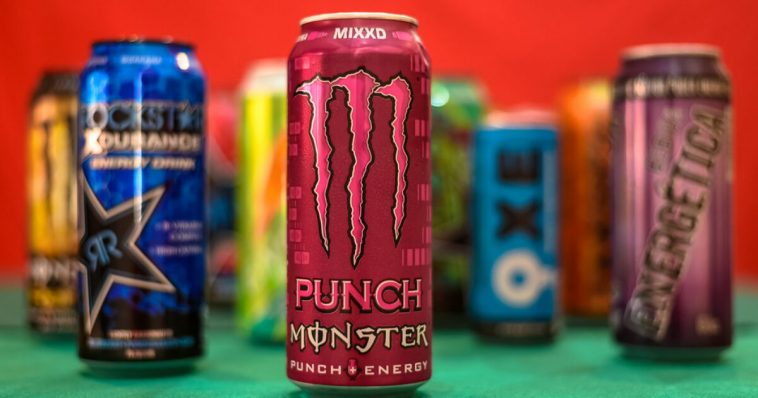From 100PercentFedUp - READ ORIGINAL
Some media, including videos, may only be available to view at the original.
Researchers at the Mayo Clinic are sounding an ‘early warning’ on a possible link between energy drinks and sudden cardiac arrest.
“Reviewing the case studies of 144 patients who survived a sudden cardiac arrest, researchers at The Mayo Clinic found that seven of the survivors, about 5%, had consumed an energy drink before the life-threatening episode,” the New York Post reports.
“Energy drinks potentially can trigger life-threatening cardiac arrhythmias. It has been postulated that the highly stimulating and unregulated ingredients alter heart rate, blood pressure, cardiac contractility, and cardiac repolarization in a potentially proarrhythmic manner,” the researchers wrote.
“The electronic medical records of all SCA [sudden cardiac arrest] survivors with proven arrhythmias referred to the Mayo Clinic Windland Smith Rice Genetic Heart Rhythm Clinic for evaluation were reviewed to identify those who consumed an energy drink before their event. Patient demographics, clinical characteristics, documented energy drink consumption, and temporal relationship of energy drink consumption to SCA were obtained,” the researchers added.
Doctors are ‘raising alarms’ over energy drinks linked to sudden heart attacks: report https://t.co/qs1P7FZCB1
— Jack Straw (@JackStr42679640) June 8, 2024
“Although the relative risk is small and the absolute risk of sudden death after consuming an energy drink is even smaller, patients with a known sudden death predisposing genetic heart disease should weigh the risks and benefits of consuming such drinks,” Dr. Michael J. Ackerman, the lead study author and a genetic cardiologist at the Mayo Clinic said, according to the New York Post.
From the New York Post:
Professor Peter Schwartz, the director of Italy’s Center for Cardiac Arrhythmias of Genetic Origin and Laboratory of Cardiovascular Genetics, said the findings aren’t “just an association by chance.”
“We, as well as the Mayo Clinic group, are perfectly aware that there is no clear and definitive evidence that energy drinks indeed cause life-threatening arrhythmias and that more data are necessary, but we would be remiss if we were not sounding the alarm,” he wrote.
By comparison, a cup of coffee contains roughly 100mg of caffeine, energy drinks contain anywhere from 80mg to 300mg per serving, and Panera Bread’s now discontinued “Charged Lemonade” which allegedly caused a near-fatal cardiac arrest in a teen who drank it, contains 390 mg of caffeine.
In reasonable doses, caffeine can be good for us. It increases alertness and heart rate. Drinking black coffee specifically has been linked to weight loss and a lower risk of developing both Alzheimer’s disease and type 2 diabetes.
Doctors are now saying energy drinks may be linked to sudden heart attacks, according to the Mayo Clinic. pic.twitter.com/SY4LrgyGmh
— Daily Loud (@DailyLoud) June 7, 2024
“Among 144 SCA survivors, 7 (5%; 6 female; mean age at SCA 29 ± 8 years) experienced an unexplained SCA associated temporally with energy drink consumption. Of these individuals, 2 had long QT syndrome and 2 had catecholaminergic polymorphic ventricular tachycardia; the remaining 3 were diagnosed with idiopathic ventricular fibrillation. Three patients (43%) consumed energy drinks regularly. Six patients (86%) required a rescue shock, and 1 (14%) was resuscitated manually. All SCA survivors have quit consuming energy drinks and have been event-free since,” the researchers wrote.
“Overall, 5% of SCA survivors experienced SCA in proximity to consuming an energy drink. Although larger cohort studies are needed to elucidate the incidence/prevalence and quantify its precise risk, it seems prudent to sound an early warning on this potential risk,” the researchers concluded.
Per Independent:
London-based nutritionist Beanie Robinson, founder of The Health Space, says anyone looking to wean themselves off energy drinks should consider switching to fizzy water.
The nutritionist says: “I don’t think we want to be relying on energy drinks for energy, I encourage clients to drink filtered water – this is what gives us energy.
“Consuming a high amount of energy drinks is exposure to caffeine, artificial flavourings and sweeteners that can affect our energy and gut levels.
“If you love an energy drink every now and again, it probably isn’t going to do any damage, however, there are better alternatives which avoid sugar and caffeine.”
She also recommends adding a squeeze of lemon, lime, cucumber or mint to still or fizzy water, to give it extra flavour.
Read the full study at Heart Rhythm.


